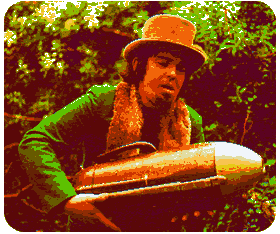
Well, I suppose I was always going to stick up for the singer. "Tell us a story about Frank Black...you know him, tell us a story." And the editor says, "Stick something in the article personal like you did for those other articles you wrote." Every band needs one person to be the jerk who wades into the sewage -- who's not even HAPPY until it gets neck high. Mostly it's the singer. Now, the upside is that he gets lots of the credit. The downside is that he gets ALL of the blame AND he has to appear in other people's stories. That's the point. Being a pawn in somebody's story. When you achieve the stature of a Don Van Vliet the stories are many and big.
Culture happens in secret. It is conceived within a brotherhood, masonic and eternally closed to the uninitiated. Civilians are awed by cold ashes and dead embers. They rarely experience sparks and fire, and can misinterpret even those rare occasions when the curtains of the known world do get pulled back.
So it is interesting that in the compendium of voices that is Grow Fins -- the 112- page booklet is full of interviews with the Magic Band and a commentary from John French -- the one voice that is missing is Mr. Van Vliet's. Even the pride of the box, the disk of Trout Mask House Sessions (1969), is 73 minutes of band "rehearsals"-- essentially Trout Mask Replica itself but stripped of vocals. The producers of Grow Fins, following on in the archaeological dig methodology of The Pet Sounds Sessions, clearly aim to redress a balance.
The years covered are pre-Safe As Milk to post-Spotlight Kid (there are tokens from '75-'82). The booklet is impressive and, as a sweetener to those who own some of the material on bootleg, there's an enhanced CD that features four Quicktime movies of TV appearances (but the clips are murky and the digitization choices suspect). The pre-Trout Mask Replica (TMR) period, after a great version of "Electricity" and some early blues material, is better represented via out-takes available on other releases. The choices from the post-TMR period are patchy, often mystifying and seem chosen for doctrinaire reasons rather than musical (an exception is a duet of "Orange Claw Hammer" with Frank Zappa).
Musicians have always recognized that drummer John French is the unsung hero, and the contributions of the Magic Band undervalued. I'm not convinced Grow Fins survives the effort devoted to pointing that out. The five CDs of live performances, demos, out-takes and radio shows aim to suggest a gestaltist process at work between Mr. Van Vliet and the Magic Band. Fair enough. And the tension that arises between musicians' testimony and the masonic reticence to betray band secrets -- the undoubtedly bizarre conditions in force at the Trout Mask House are only outlined -- is compelling. What it is that makes for a band, and the internal dynamic of the band brotherhood, is endlessly fascinating stuff. Civilians rarely have access to it. Here there are only glimpses. Still, the code of "Omerta" has been broken and I don't feel good about it. I applaud de-mystification... as part of the process, not post-facto. Culture happens in secret. The value of the box is to broach the subject. But recognize that exposure muddies the truth.
Grow Fins has an agenda and its focus is the Trout Mask House Sessions. TMR was a manifesto, a roadmap of possibilities; but in the same way that a map will excite and even motivate a generation but cannot MOVE you deep, somewhere DEEP, TMR arguably misses the visceral thrill of The Going and of The Being There. Especially so as represented here, largely bereft of the vocals. To hear the detail in the instrumentation is wonderful, revealing(!), but without the human voice music will become an exercise of craft. Which compounds a detachment I feel at the heart of TMR. The raw folk passion, or soul, that drives Captain Beefheart's best work -- according to the evidence of the albums that immediately precede and, more tellingly, follow it -- is somehow not realized.
TMR is a timeless masterpiece. By law all Americans should own a copy. It represents the discovery of a continent, but the pioneering of that land would prove to be more moving.
Video clip #1:
AVI Format (2.09 MB)
Quicktime Format (1.85 MB)
Video clip #2:
AVI Format (1.69 MB)
Quicktime Format (1.85 MB)
David Thomas is the singer with a band called Pere Ubu. He has a new album entitled Mirror Man.
